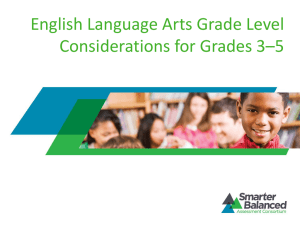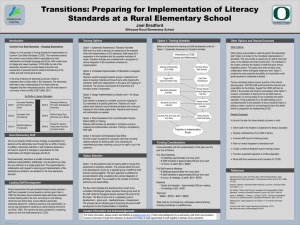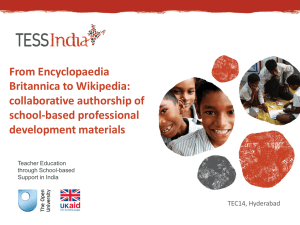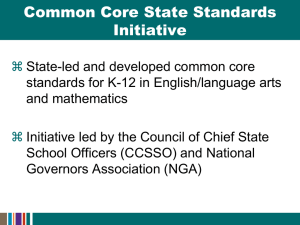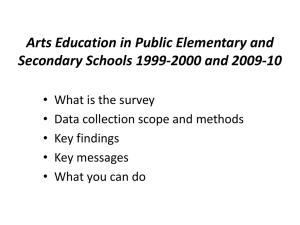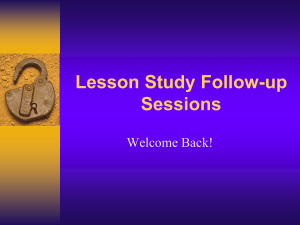How to Help Your Child Succeed in the
advertisement
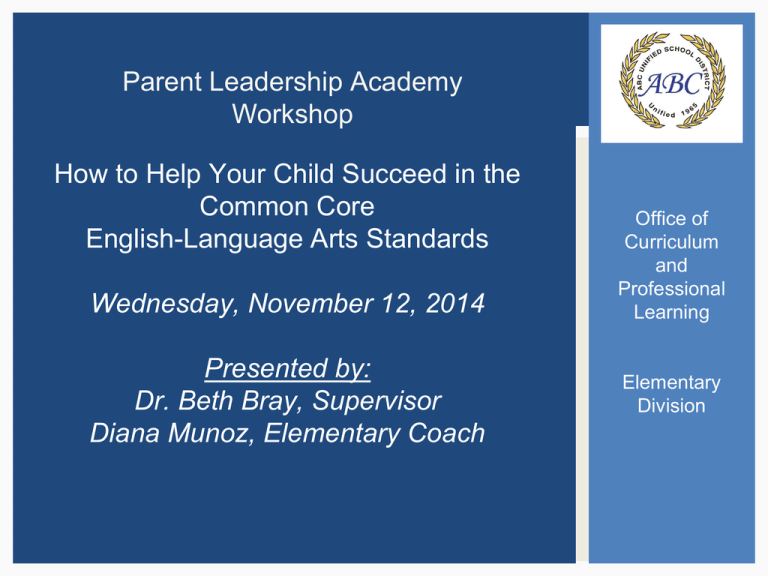
Parent Leadership Academy Workshop How to Help Your Child Succeed in the Common Core English-Language Arts Standards Wednesday, November 12, 2014 Presented by: Dr. Beth Bray, Supervisor Diana Munoz, Elementary Coach Office of Curriculum and Professional Learning Elementary Division What we hope you will learn today: ● Key ideas regarding the Common Core Standards in English-language arts (ELA) ● ABCUSD ELA focus areas ● Strategies to help your child in each focus area ● Other resources available in each focus area Office of Curriculum and Professional Learning Elementary Division A Quick English-language arts Review The standards were written by planning backwards from college to kindergarten. The English-language arts anchor standards are the same for all grades. The anchor standards build in complexity to prepare students to be college and career ready. Reading includes literature and informational text. Office of Curriculum and Professional Learning Elementary Division Top three things you should know about Common Core This is not a federal mandate or curriculum. ● Standards are adopted by the state board of education. ● They were created by teachers, college professors and researchers based on what students will need to be successful in college and career. Common Core is not taking away local control. ● Each state and/or district decides how they will meet the standards. You will feel some shifts and that is a good thing! ● Students are being asked to do more than finding answers and completing tasks. They are now being asked to reason, work through complex problems and reading both fiction and nonfiction books. Office of Curriculum and Professional Learning Elementary Division Common Core State StandardsEnglish-language arts English-language arts standards are based on anchor standards which build upon each other from Kindergarten through 12th grade. Anchor Standards # Reading Informational 10 Reading Literature 10 Writing 10 Listening and Speaking 6 Language 6 Foundational Skills (K-5th) 4 Office of Curriculum and Professional Learning Elementary Division Three ELA Focus Areas Focus #1 Text- Dependent Questions Three types of text-dependent questions 1. Questions that assess themes or central ideas 2. Questions that assess knowledge of vocabulary 3. Questions that assess syntax and structure Office of Curriculum and Professional Learning Elementary Division Three ELA Focus Areas Focus #1 Text- Dependent Questions 1. Questions that assess themes or central ideas These questions focus on theme, interaction of characters, changes in the story over time, or important events in the story. Office of Curriculum and Professional Learning Elementary Division Three ELA Focus Areas Focus #1 Text- Dependent Questions 1. Questions that assess themes or central ideas The Tortoise and the Hare The Hare was once boasting of his speed before the other animals. "I have never yet been beaten," said he, "when I put forth my full speed. I challenge any one here to race with me." The Tortoise said quietly, "I accept your challenge.” "That is a good joke," said the Hare; "I could dance round you all the way." "Keep your boasting till you've won," answered the Tortoise. "Shall we race?" So a course was fixed and a start was made. The Hare darted almost out of sight at once, but soon stopped and, to show his contempt for the Tortoise, lay down to have a nap. The Tortoise plodded on and plodded on, and when the Hare awoke from his nap, he saw the Tortoise just near the winning-post and could not run up in time to save the race. Then the Tortoise said: "Slow but steady progress wins the race." Office of Curriculum and Professional Learning Elementary Division Sample Questions 1. What lesson is taught in this story? a. Being fast helps you win. b. Tortoises are faster than hares. c. It is better to keep going and not give up. Office of Curriculum and Professional Learning 2. Which sentence from “The Tortoise and the Hare” tells the lesson? Elementary Division Three ELA Focus Areas Focus #1 Text- Dependent Questions 2. Questions that assess knowledge of vocabulary These questions focus use word knowledge to answer questions about the text. Office of Curriculum and Professional Learning Elementary Division Three ELA Focus Areas Focus #1 Text- Dependent Questions 2. Questions that knowledge of vocabulary Office of Curriculum and Professional Learning Elementary Division Three ELA Focus Areas Focus #1 Text- Dependent Questions 3. Questions that assess syntax and structure These questions are crafted to point students’ attention to features in the text that enhance understanding. Office of Curriculum and Professional Learning Elementary Division Three ELA Focus Areas Focus #1 Text- Dependent Questions 3. Questions that assess syntax and structure What words or phrases grab your attention? How does the author help you learn about the setting? Office of Curriculum and Professional Learning Elementary Division Three ELA Focus Areas Focus #1 Text- Dependent Questions 3. Questions that assess syntax and structure Office of Curriculum and Professional Learning Elementary Division Text Dependent vs. Non TextDependent Questions 3rd Grade Comparison ’97 California Standards Common Core Standards Why do you think puffins come ashore on inhabited islands as well as uninhabited one? Puffins spend most of their lives on ocean water. They rarely come to land. Why are they flying to the island at the beginning of the story? Provide textual evidence. Office of Curriculum and Professional Learning Elementary Division Asking your Child Text Dependent Questions Read the passage from the story, “Nights of the Pufflings” ● Working in groups at your tables, create a text-dependent question to ask other groups How do the _____ feel about the ________? (pg. ___) How does the picture on page __, help the reader understand _______________? What details does the author What phrases did the author use include that shows ___________? to describe__________? Explain (pg.___) in your own words what the phrase means. What does the word ______ mean on page ____? Cite evidence from the text that __________________. (pg. ___) Office of Curriculum and Professional Learning Elementary Division Three ELA Focus Areas Focus #1 Text- Dependent Questions What can parents do? ● Talk about the books or stories your child is reading. ● Ask your child to explain their thinking. ● What did you read to support your thinking? ● What did you learn after reading this sentence or paragraph? ● What supporting details does the author use? Office of Curriculum and Professional Learning Elementary Division Text-Dependent Question Resources www.readwritethink.org www.learninga-z.com www.achievethecore.org www.bookadventure.com www.learnzillion.com www.pbs.org www.funbrain.com www.playkidsgames.com Office of Curriculum and Professional Learning Elementary Division Three ELA Focus Areas Focus #2 Academic Vocabulary ● They are critical to understanding academic texts. ● They appear in all sorts of texts. ● They require deliberate effort to learn. Office of Curriculum and Professional Learning ● They are far more likely to appear in written texts than in speech. Elementary Division ● They often represent subtle or precise ways to say otherwise relatively simple things. ● They are seldom heavily scaffolded by authors or teachers. Three ELA Focus Areas Academic Vocabulary Vocabulary in Context Reading Standard 4 Interpret words and phrases as they are used in a text and analyze how specific word choices shape meaning or tone. Office of Curriculum and Professional Learning Elementary Division Vocabulary Matrix Text: Nights of the Pufflings Word Word uninhabited pg. 21 stranded pg. 27 roaming pg. 27 Definition Definition Related Words Related Words Sentence Sentence They are coming back to Halla’s island and the nearby uninhabited islands to lay eggs and raise puffin chicks. Halla and her friends will spend each night searching for stranded pufflings that don’t make it to the water. By ten o’clock the streets of Heimaey are alive with roaming children. Visual Visual Office of Curriculum and Professional Learning Elementary Division Three ELA Focus Areas Focus #2 Academic Vocabulary Critical Vocabulary Questions to Consider: https://www.teachingchannel.org/videos/improving-student-vocabulary ❖ How does Ms. Kim make vocabulary a natural part of the classroom? ❖ How does the students' response to this strategy change over time? ❖ Is this something you could do with your child? Office of Curriculum and Professional Learning Elementary Division Critical Vocabulary you can use with children Instead of saying Use critical vocabulary What are the differences between these two? How would you DISTINGUISH these two? How can you put these into groups? How can you CLASSIFY……? Let’s work this problem. Let’s ANALYZE this problem. What do you think would have What do you SPECULATE happened if…? would have happened if….? How do you know that’s true? What EVIDENCE do you have to support your claim? How else could you use this? How could you APPLY this? Office of Curriculum and Professional Learning Elementary Division Three ELA Focus Areas Focus #2 Academic Vocabulary What can parents do? ● Become familiar with their student’s assigned vocabulary words and provide opportunities for them to practice using these words in daily interactions. ● Read multiple books about the same topic. ● Talk to your children. ● Read to your children. ● Listen to your children. Office of Curriculum and Professional Learning Elementary Division Vocabulary Resources www.englishcompanion.com www.vocabulary.com/ www.visualthesaurus.com/ www.vocabgrabber.com www.learninga-z.com www.achievethecore.org www.learnzillion.com www.learninggamesforkids.com www.pbs.org www.funbrain.com www.playkidsgames.com Office of Curriculum and Professional Learning Elementary Division Three ELA Focus Areas Focus #3 Writing from sources ● Students can read a text closely to determine meaning both literally and inferentially. ● Students speak and write using evidence from the text to inform or make an argument. Office of Curriculum and Professional Learning Elementary Division Informational Narrative Prompt GRADE 3 Nights of the Pufflings In Nights of the Pufflings, the children take care of pufflings and release them back into the wild. Imagine you visited Heimaey Island during the nights of the pufflings. What would you do to help the pufflings get to safety? Write an essay about your time on Heimaey Island. Describe the animals and the habitat of the island. Use facts from the story to tell about your activities. Use dialogue and descriptions of actions, thoughts, and feelings to show what happens in the story. Give your story an ending. Office of Curriculum and Professional Learning Elementary Division Three ELA Focus Areas Focus #3 Writing from sources What can parents do? ● Provide opportunity for your student to read a wide variety of genre, which exposes students to different types of writing. ● Cultivate a home environment that inspires students to write: ○ Video journal of their vacation ○ Neighborhood Newsletter ○ Letters to Congress with evidence to support their claim/position ● Encourage students to use technology to publish their work. Office of Curriculum and Professional Learning Elementary Division Writing Resources www.writingfix.com www.theteacherscorner.net www,thestorystarter.com www.readwritethink.org www.learninga-z.com www.kids.usa.gov www.netrover.com www.funenglishgames.com www.learnzillion.com www.pbs.org Office of Curriculum and Professional Learning Elementary Division Links to the Common Core Standards ELA CCSS http://www.cde.ca.gov/be/st/ss/documents/finalelac cssstandards.pdf Math CCSS http://www.cde.ca.gov/be/st/ss/documents/ccssma thstandardaug2013.pdf Office of Curriculum and Professional Learning Elementary Division Questions Please feel free to contact us if you have any other questions. Dr. Beth Bray- beth.bray@abcusd.us (562) 926-5566 ext. 21075 Diana Munoz- diana.munoz@abcusd.us (562) 926-5566 ext. 21078 Office of Curriculum and Professional Learning Elementary Division

